Strawbridge opens up on his medical ordeal which he overcame to become central to England’s coaching team
Andrew Strawbridge is the England coach you might be least familiar with. A Kiwi who played for Waikato before moving into coaching, the 61-year-old was brought into Steve Borthwick’s set-up full-time before the tour to Japan and New Zealand in 2024.
He had been a consultant in the Six Nations before and previously coached the likes of the Chiefs, Samoa and even the All Blacks. His eye for detail tallies with Borthwick’s scrupulous methods. As we found out when we met him in camp in Girona, Strawbridge also has quite the story to tell.
Read more: 10 things to know about England coach Steve Borthwick
For the uninitiated, how would you explain your role in the England environment?
I don’t know if there’s a single word that encompasses it. I help the coaches with their coaching, create the teaching and learning environment, and work on technical aspects. If I have a point of difference, it’s around the technical aspects. I help out as much as I can with movement, handling and tackling.
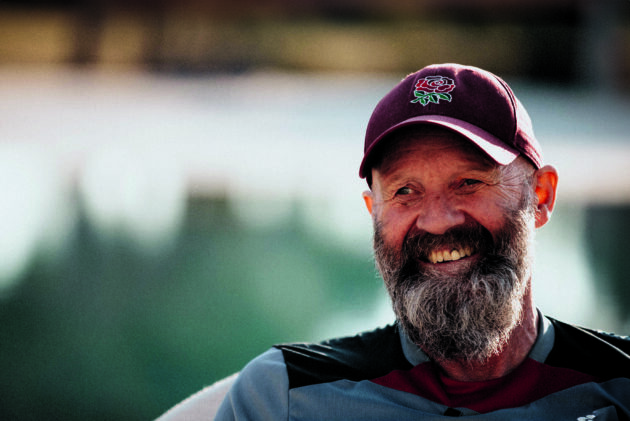
Andrew Strawbridge smiling (Ben Brady/Inpho)
Where do you think you’ve had the biggest impact since you joined?
You try to establish relationships, authenticity and credibility. It takes a while, especially when you’re from outside the group. So getting people to listen is a win. We’ve changed the way we do some things at training; there’s a lot more handling and movement prep.
Why is that?
It’s about stretching the way we can play, having more ammunition. The world is moving towards taking advantage of transitional opportunities. I’m not sure why people haven’t thought about it more, but suddenly the South Africans and Scottish are good at it – establishing play and winning the chaotic moments when the ball is turned over, either from a tackle or defence. That requires being in position quickly, seeing things quickly and executing effectively and efficiently.
Related: Learn more about England centre Fraser Dingwall
From a technical standpoint, if there was an England player coming into camp for the first time, what kind of things would you be looking to improve?
It can be anything. For instance, we work with guys before and after training on catch-pass skills – it can be as simple as that. We’re also doing footwork with tight forwards, focusing on winning the race to space. It’s one thing to expose space, another to win a race to it. Generally, it’s about movement.
Rugby is a game, and there’s a high level of competency around structure and process. But it’s still a game where, in a one-on-one situation, it’s about whoever is ‘alive’ the longest, offensively or defensively, and has a better chance of winning a moment. So it’s still about teaching people to move and exposing different ways of thinking about it, making what you have to think about become an unconscious act. We’re trying to reach that level of unconscious competency where you don’t have to think; you’re talking about feelings because that’s how familiar things can become if you do the right things.
What’s it like working with Steve Borthwick?
I enjoy working with Steve. We’re different men, very different men, in just about every conceivable way. But I enjoy his forthrightness, his intellect and his openness to discuss things in appropriate moments. He’s a meticulous planner and a hard worker, and I enjoy both of those things. I sometimes approach things a bit from left field, and he’s open to listening to and considering those things, which creates a healthy environment.
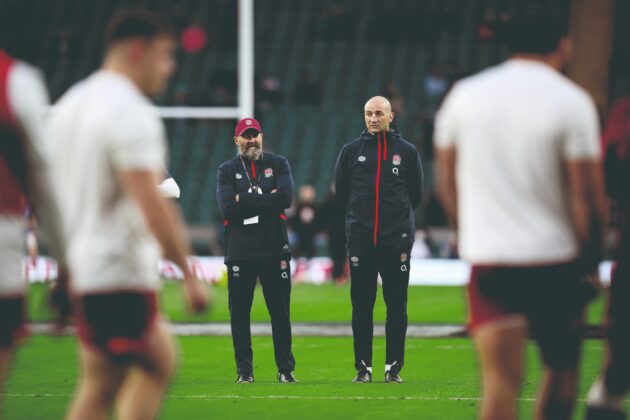
England Consultant Coach Andrew Strawbridge looks on with England Head Coach Steve Borthwick (Getty Images)
Was coaching England always on your radar?
No, honestly, hand on heart, I can say no. I don’t care who I coach. I just want to be in an environment that wants to get better, where people are driven and help develop that, where people listen to each other and there’s input. It doesn’t matter if it’s an U12 side, an U18 side, a club side or a national team. A lot of it is about the relationships you form. I spoke to Steve when he took over at Tigers and I was looking at coming over, but then Covid hit. We just kept talking about rugby and helping each other with our development as coaches, and this opportunity eventually arose.
Read more: Rugby tactics
What do you think would surprise people to know about the England environment from an outside perspective?
The first time I sat down with an English player a year ago, he started talking about his business of creating media content and selling things to companies like Netflix. I hadn’t experienced anything like that before, sitting next to a player who is an entrepreneur. I’ve had many interesting non-rugby conversations with players here that I perhaps haven’t always had in previous environments. There are some very clever people in this England environment.
How did you end up contracting sepsis in 2015?
It was a while ago now, before the World Cup, I was going over to Samoa. They were playing the All Blacks and I was going to start working with them. I got sick on the way over and that developed into sepsis, which became a life-threatening issue and knocked me around a fair bit. A graze on my eye allowed an opportunity for some bugs to get into my body that shouldn’t have been there.
Coupled with the flight and the fact that I was on prednisone (a drug to suppress the immune system) for something else, all these little magical moments aligned to lead to sepsis. Sepsis is an insidious thing. I sit here and it’s knocked me around a bit, but there are people who have been knocked around a lot worse, and so many people who haven’t survived that experience. So, man, it was pretty challenging.
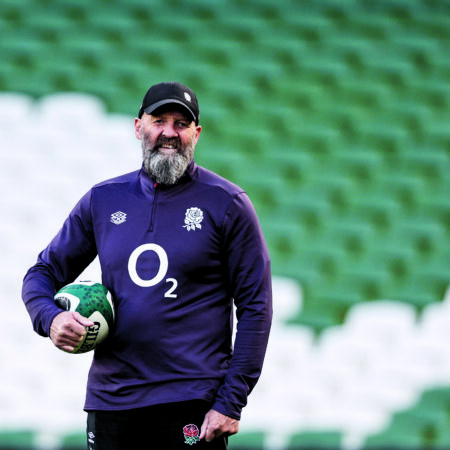
Andrew Strawbridge with a rugby ball in his hands (Ben Brady/Inpho)
When did you realise it was serious?
I didn’t, I was in a coma. I hopped off the flight, went to the hospital, was given oral antibiotics, which wasn’t enough. I was left in a hotel room for a while and went into a coma, in and out. I was lucky there was a doctor in Samoa at the time from New Zealand who looked after me or I wouldn’t be here. The ICU facilities in Samoa weren’t great, so nurses were holding bits of tubing onto the machine that was keeping me alive, standing there attending to me. I was lucky that people gave up their time. I know it’s their job but I wouldn’t be here if that hadn’t happened.
How long were you in a coma for?
I try not to think about it. When you’re in that situation, life and death, it gets to the point where you roll the dice and throw everything into the mix. I think that’s what happened with me. They just threw everything at me, and that might have killed me, but this was going to. I don’t know why I’m here. Maybe because I’m a stubborn bastard, I don’t know. It’s not a conscious thing; you’re all over the place. There’s a thing called ICU psychosis where you have psychotic episodes, principally because of the drugs to keep you alive. I lived in that world for a little while and it was scary. I know many people who’ve done that and it’s a frightening time. But I don’t want to dwell on the experience because it was unpleasant and not nice to hear.
Related: Burton’s medical battle back to rugby pitch
How did you deal with those after-effects?
It’s one thing to survive, another to deal with everything that comes with it. I don’t like talking like this because there are people who don’t survive and it’s a lottery. I might have been incredibly unlucky to get what I got, but I’m incredibly lucky to survive what I got. I was sent home in a pretty feeble state – I might look feeble now, but believe me, I looked a lot more feeble then.
I had no certainty about what was going to happen and that was a bit scary. So you start making provisions for your family. I couldn’t get around much; I had tubes out of me for several months after and daily visits and drugs. But here I am. I can walk around mostly. I struggle to catch a ball because I have one eye. It’s what life’s about.
Given your line of work, did losing sight in your eye make you doubt whether you could return to coaching?
No, I never thought about it. I remember being really scared about driving but then I started to feel better. Then I had an argument with my wife and jumped in the car and drove off. It wasn’t until I was halfway down the street that I realised I was driving with one eye. At least I can survive like this. I know people survive with far greater challenges than that. But in a world where you’re dealing with skill acquisition and challenging players, a good day is when I don’t drop the ball or get through a session without hurting a finger or getting hit in the head by the ball.
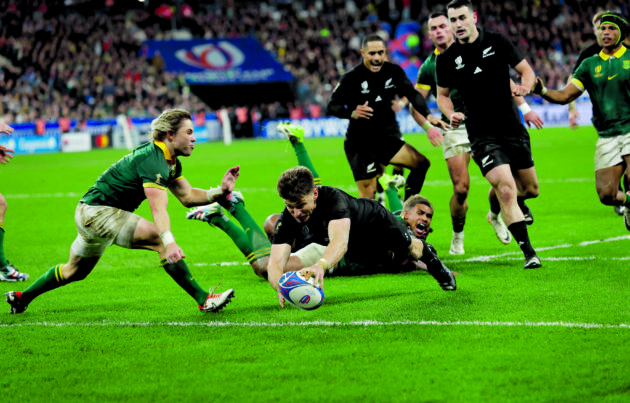
Beauden Barrett of New Zealand scores the only try of the game during the Rugby World Cup 2023 Final (Getty Images)
Your last job was with the All Blacks, reaching the World Cup final in 2023. How proud are you of the work you did there, even though you came up one point short against the Springboks?
It was a similar situation for me. I was called in to help with the environment, with the learning, and with some of the technical skills. A lot of it isn’t explicit teaching; it’s experiential learning, providing opportunities and guiding what happens within it, leading to self-discovery. That rings true.
So you provide opportunities and start normalising footwork, different types of movement, height change or winning the race to space. You don’t have to explicitly state what you’re looking for; you can talk about the outcome and players will get there pretty quickly. That was the same there, and we’re getting shifts here now too. There are some good coaches coaching attack and defence.
Is it different coaching your own country?
I look back and I’m really pleased and proud that I got to do that for five minutes. I didn’t think I’d feel that way but I did. That World Cup final, I felt devastated for all the players because it was so close. They did very well and there are such small margins in sport, aren’t there? I’m grateful for that opportunity.
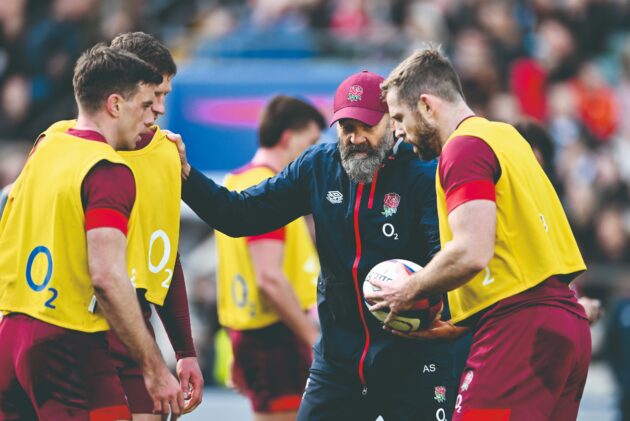
Andrew Strawbridge, Consultant Coach of England talks with George Ford, Fraser Dingwall and Elliot Daly (Getty Images)
You used to be a school teacher. Where are we going wrong with reduced participation numbers in rugby and sport in general?
It’s happening the world over. I’ve been to a lot of places in the last few years looking at rugby and there are only a couple of places where it’s flourishing. New Zealand is struggling at a grass-roots and club level; it’s very, very difficult.
It’s a sport in turmoil. Forget about who’s leading it or why. Sport is battling a little bit in terms of its social profile, its importance and significance for people. That’s not right or wrong, it just is. I know what I think people can get out of playing sport, but some people don’t think that’s important and that’s okay. I’ll do my job and my bits.
It’s difficult to get participation in sport as when I was a school teacher, my principal didn’t talk to me about how I was going to teach. He said, “What sports team are you taking?” because you were taking a sports team. That’s how it used to be. Now, I don’t blame teachers for this, but there’s been a significant drop-off in teacher participation in co-curricular activities because they’re people with lives.
We’re all busy and everything has complicated layers added all the time. Many parents take their kids’ sports teams because no one else can or has the time. It’s a world in turmoil at the moment; many people are battling, just working hard to keep their heads and their families’ heads above water, so they help out where they can.
Read more: Grassroots technology to protect health
Do you coach your kids?
I coach my daughters in football, cricket, netball, hockey. I don’t know anything about those sports. I know a bit about movement. You give when you can and that’s special, isn’t it, to be able to do something a bit different with your kids, whatever it might be.
Download the digital edition of Rugby World straight to your tablet or subscribe to the print edition to get the magazine delivered to your door.
Disclaimer : This story is auto aggregated by a computer programme and has not been created or edited by DOWNTHENEWS. Publisher: rugbyworld.com






